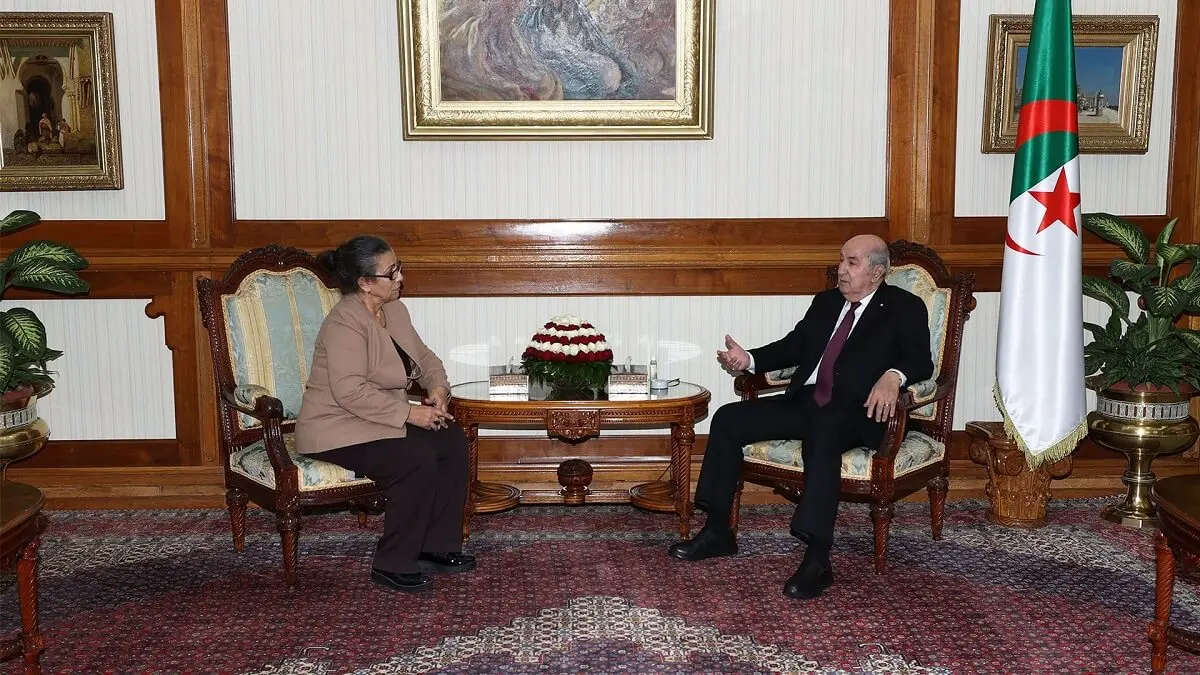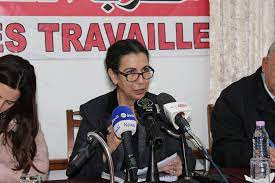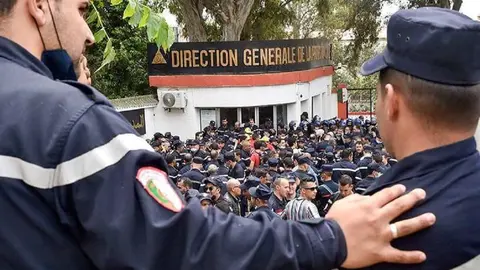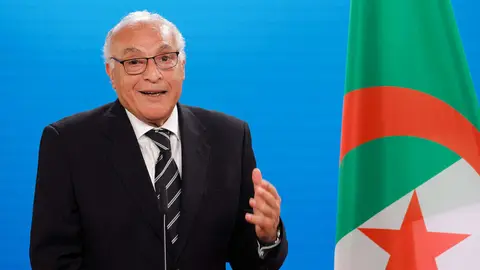The Secretary General of the Workers' Party, after being received by Tebboune: "Moroccan-Emirati plot against Algeria, with the help of Israel"

Louiza Hannoune was described as "beautiful and rebellious" when she revealed herself to Algerian public opinion in the wake of the political opening of the early 1990s. The Secretary General of the Workers' Party, the only Trotskyist party in the Arab world, this lawyer by training, born in 1954 into a farming family in Jijel (northeast Algeria), grew up in the city of Annaba, 600 km east of Algiers, which she left after graduating in law from Badji Mokhtar University. Louiza Hannoune moved to Algiers, where she joined the Socialist Workers' Organisation (OST) before helping to found the Workers' Party, which she has chaired since its foundation.
A fierce opponent of the regime, she was part of a wave of prisoners of all political persuasions sent to jail by the late Chadli Benjedid, then President of the Republic. She spent six months in detention. That was in 1986.
Three years later, Algeria opened up to pluralism and Louiza Hannoune revealed herself to public opinion, which loved her scathing discourse, her firmness against the ruling regime and her moral integrity. This was enough to make her political party the only Trotskyist party elected representative in the Arab world. "We voted for her, not for Trotskyism", totally unknown in Algeria. Moreover, in order to be convincing and to attract the sympathy of the voters, the Workers' Party candidates insisted on claiming to be members of Louiza Hannoune's party.
She was the first and only female candidate for the supreme magistracy in 2004 and 2009, against Abdelaziz Bouteflika's candidacy. While in 2009 she obtained 1% of the vote, with 101,630 votes, five years later she came second behind the president-elect, with 4.22%.
Since then, Louiza has shown sympathy for Bouteflika and, above all, for his younger brother Saïd, a former trade unionist (when he was a professor at the Houari Boumediene University in Algiers), with whom she shared certain ideological affinities. According to the inhabitants of Annaba, this rapprochement allowed him to take his "share of the cake". He is said to have invested in a real estate development of four or five buildings in the Sidi Aïssa region, near the heights of Seraïdi, at the time of General Gaïd Salah, Chief of Army Staff and Deputy Minister of National Defence under Bouteflika.
Her foray into business and real estate development distanced him from the popular masses who had adopted her. Her discourse became more watered down, her positions less biting, and during the Hirak he was barely visible, if not invisible. Instead, she sided with El-Mouradia, seeking a way out of the crisis that had arisen in concert with Saïd Bouteflika and General Mohammed Mediene, alias Toufik, the former head of the DRS. This conclave cost her dearly. She has been discredited in the eyes of public opinion for having colluded with two figures hated by the people.
On 9 May 2019, she was remanded in custody in the Blida civilian prison after being heard by the military prosecutor as a witness in the case known as "undermining the authority of the army" and "conspiracy against the authority of the state", opened against Saïd Bouteflika, the former president's brother, and two former senior intelligence officers, Mohammed Mediène and Athmane Tartag. On 26 September, she was sentenced to 15 years' imprisonment for "conspiracy with meetings" aimed at "undermining the authority of the state and the army". Her appeal was heard by the Blida Military Court of Appeal from 9 February 2020. She was sentenced to three years' imprisonment, including nine months' imprisonment, and was released after serving her sentence.

Since then, Louiza Hannoune has kept a low profile. She has not been heard to denounce the wave of repression sweeping the Algerian people. Not a word about the hundreds of prisoners of conscience. Not a word on the distancing of the press from the government, nor on the deteriorating living conditions of the Algerian people.
It was only two days ago that Louiza Hannoune appeared before President Tebboune at the seat of the Presidency of the Republic. At the end of the hearing, she delivered a speech that amounted to a plea on behalf of the government, in which she focused on the regime's favourite topic: the external threat.
48 hours after Tebboune's hearing, the immovable secretary general of the Workers' Party held a press conference. Although she made it clear from the outset that she was "not there to speak on behalf of the head of state", she did much better. She set herself up as a good defender of the regime and shouted out loud what Tebboune and his entourage thought. Her speech was an all-out attack on the Arab League and the states that have normalised relations with Israel.
Louiza Hannoune repeated practically everything Tebboune told her during the three-hour hearing he gave her. According to a well-informed source, she made the same remarks she had made in the presence of the 14 national press chiefs on 3 October. He had attacked many Arab countries, Russia and African countries. Tebboune was still shocked by the rejection of the Algerian candidacy by the BRICS. He expressed a bitterness that made it impossible to broadcast the content of their meeting as originally planned.
It was not until Louiza Hannoune that the Algerian regime's intentions were finally revealed and insidiously conveyed. The articles hostile to the UAE, published by several newspapers at the dictation of the secret services, were confirmed and endorsed by the head of state. Unaware of the plans being hatched behind the scenes at the Ministry of National Defence, he dismissed his communications minister in the middle of the night over a brief report published by the daily An-Nahar announcing "the dismissal of four Emirati diplomats arrested for intelligence with the Israeli Mossad".
On this occasion, Louiza Hannoune talks about a plot hatched against Algeria by Morocco, the United Arab Emirates and Israel. Why this plot? What are the clues? What evidence is there to back up this accusation? None of the many journalists present dared to ask such uncomfortable questions. This is Algerian-style journalism.
Encouraged by the audience granted to her by Tebboune, the Algerian passionist, exultant at her return to the political scene, is making a killing. She is calling for a sacrosanct mobilisation around the regime to counter Moroccan and Emirati ambitions. This is the source of all Algeria's problems. To hell with the long queues for basic foodstuffs, the hundreds of prisoners of conscience and the violations of fundamental human rights. It is time to mobilise against the external enemy, he continues to proclaim.
What a blessing for Tebboune and his regime! Louiza Hannoune, who is getting her second wind, is proving to be his best advocate, hitherto ignored. With her usual verve, she underlined "the president's determination to ensure respect for press freedom". On the social front, he believes that "the wage increase, limited to civil servants, should be extended to all sectors of activity, both private and public". She believes that "the President is announcing good news for the coming year".
For Louiza Hannoune, the most pressing issue for Algerians is Palestine and the bloody Arab League.
Indeed, she hastened to suggest that Algeria will freeze its membership of this pan-Arab organisation infested with "Arab regimes that are traitors to the Palestinian cause". He called for the formation of a front comprising Algeria, Tunisia, Lebanon, Syria and Iraq "to counter the normalisers". As if these countries would follow Algeria's example. As if Algeria had enough credibility to rally around it the countries eager to maintain good relations with the Gulf states, which are being targeted because of Algeria's inability to supply food to its population.











